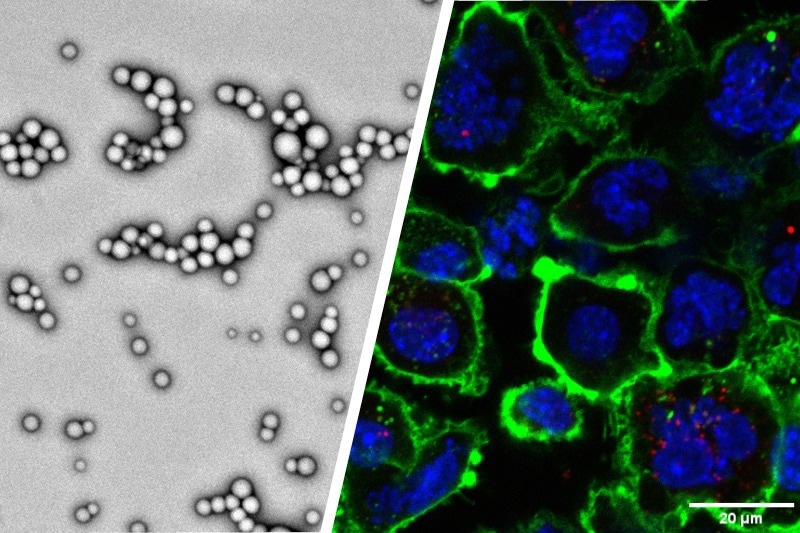Purdue College researchers are creating and testing patent-pending poly (lactic-co-glycolic acid), or PLGA, nanoparticles modified with adenosine triphosphate, or ATP, to enhance immunotherapy towards malignant tumors.

The nanoparticles launch slowly medication that trigger immunogenic cell demise (ICD) in cancers. ICD produces tumor antigens and different molecules that appeal to immune cells to a tumor’s microenvironment. The researchers added ATP to the nanoparticles, drawing immune cells to the tumor, triggering anti-tumor immune responses.
Yoon Yeo directs a crew of researchers from the School of Pharmacy, the Metabolite Profiling Facility on the Bindley Bioscience Heart, and the Purdue Institute for Most cancers Analysis within the improvement of the nanoparticles.
Yeo is the affiliate division head and Lillian Barboul Thomas Professor of Industrial and Molecular Pharmaceutics and Biomedical Engineering, in addition to a member of the Purdue Institute for Drug Discovery and the Purdue Institute for Most cancers Analysis.
The researchers verified their findings with paclitaxel, a chemotherapy drug used to deal with quite a lot of tumors. They found that tumors developed extra slowly in mice handled with paclitaxel encapsulated in ATP-modified nanoparticles than in mice handled with paclitaxel in non-modified nanoparticles.
When mixed with an present immunotherapy drug, the ATP-modified, paclitaxel-loaded nanoparticles eradicated tumors in mice and guarded them from rechallenge with tumor cells.
Yoon Yeo, Affiliate Division Head, Industrial and Molecular Pharmaceutics, Purdue College
ACS Nano revealed the research.
Challenges to Systemic Immunotherapy Supply
Immunotherapy is a promising technique for most cancers remedy, however Yeo believes it doesn’t profit an enormous variety of individuals as a result of they lack the sturdy immune cells required to assault tumors.
Yeo acknowledged, “Pharmacological brokers to activate immune cells can immediately be given to tumors. Then the immune system can combat not solely the handled tumors but in addition nontreated tumors in distant areas because the activated immune cells flow into within the bloodstream.”
Nonetheless, Yeo acknowledged that the majority tumors with a foul prognosis usually are not all the time straightforward to seek out or entry. Because of this, they might not reply properly to native remedy. She and her colleagues envisioned systemic immunotherapy supply, however there have been hurdles.
“For profitable systemic administration, energetic substances that stimulate anti-tumor immune responses have to be concurrently current in tumors to exert concerted results on the goal. The substances additionally should keep their exercise till they attain tumors, however not trigger poisonous off-target results. Furthermore, the carriers historically utilized in native drug supply supply restricted utility in systemic utility as a result of they might not be suitable with blood elements,” Yeo additional added.
Yeo and her colleagues delivered immunotherapy compounds through biocompatible polymeric nanoparticles tailor-made to soundly stimulate the immune system.
Yeo added, “We employed poly (lactic-co-glycolic acid), or PLGA, nanoparticles primarily based on the robust observe file of the polymer in FDA-approved merchandise and its routine use within the systemic supply of poorly water-soluble medication.”
After a number of systemic administrations, ATP-modified PLGA nanoparticles have been properly tolerated in mice. They might mobilize dendritic cells, immune cells that detect tumor antigens and usher in specialist immune cells to fight cancers.
Yeo famous, “Furthermore, the nanoparticles have been proven to regulate the discharge of paclitaxel to attenuate its systemic toxicity.”
The Subsequent Growth Steps
Yeo and her associates intend to conduct extra analysis on the ATP-modified nanoparticles.
“We’re at present engaged on bettering the supply of the nanoparticles to tumors and mixing them with different remedies that can circumvent the resistance to the nanoparticle-delivered immunotherapy. To finance these efforts, we’ll apply for continued help from the Nationwide Institutes of Well being. We’re additionally open to trade partnerships to take this know-how to the clinic,” Yeo added.
After Yeo revealed the nanoparticle concept to the Purdue Innovates Workplace of Expertise Commercialization, the latter filed a patent utility with the U.S. Patent and Trademark Workplace to safeguard mental property. Joe Kasper, assistant director of enterprise improvement and licensing for biosciences, could be contacted at [email protected] concerning observe code 69546 by trade companions who’re serious about growing the compound or commercializing it for the market.
The Purdue Institute for Most cancers Analysis, the Indiana Medical and Translational Sciences Institute, the Nationwide Heart for Advancing Translational Sciences, and the Nationwide Institutes of Well being offered funding for Yeo’s research.
Journal Reference:
Kwon, S., et. al. (2024) Systemic Supply of Paclitaxel by Discover-Me Nanoparticles Prompts Antitumor Immunity and Eliminates Tumors. ACS Nano. doi:10.1021/acsnano.3c11445
Supply: https://www.purdue.edu/

